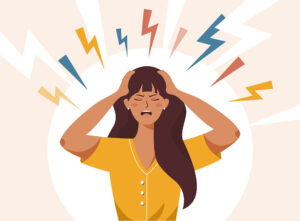Anger isn’t inherently negative; it can be a valuable and adaptive emotion. When a women experiences anger when your personal boundaries have been violated, often indicating that something or someone may pose a threat to us.
Thus, anger serves as an important signal related to our well-being—one that requires our attention.
The concern with anger lies not in the feeling itself (which can be uncomfortable, but isn’t problematic), but rather in how we respond to it.
It’s the intense reactions—the outbursts—that create issues in our lives.
So, how can we effectively manage these outbursts?
The answer depends on whether you address the anger before it escalates, during the outburst, or after it has occurred.
Thinking about planning or preparing for your anger can feel akin to anticipating a root canal—not only is it not particularly accommodating for women with ADHD, but who really wants to dedicate time to contemplating such an uncomfortable emotion?
But hear me out.
A bit of preparation upfront can help you avoid many situations where your anger might otherwise spiral out of control.
Identify your triggers: Does your mother-in-law’s subtle criticism during family gatherings make you want to scream, or do rush hour traffic jams drive you insane? Reflect on the moments when you feel angry—what common elements emerge? These are your triggers. Once you recognize them, you can work to preemptively address them.
Manage your stimulation: Women with ADHD are much more likely to become angry if you are already overwhelmed. By controlling the amount of stimulation, you experience and calming your nervous system, you give your brain a better chance of responding in a rational manner when anger strikes.
Establish your boundaries: Anger often stems from perceived threats, with one major trigger being when people violate our emotional or physical boundaries. By recognizing your limits and communicating with them clearly beforehand, you can help others avoid crossing them.
Move your body: The ADHD brain often has difficulty with emotional regulation, which can exacerbate feelings of anger. Exercise can help balance these regulatory challenges by releasing the three key neurotransmitters that promote well-being: dopamine, serotonin, and norepinephrine. Engaging in physical activity gives your brain a better chance to manage incoming anger effectively.
Prioritize sleep: A fatigued brain is a breeding ground for anger. Lack of sleep leads to elevated cortisol levels, which primes the brain to perceive everything as a threat, hindering clear thinking. A full night’s rest replenishes your brain and helps reduce cortisol levels, enabling you to process situations more effectively.
